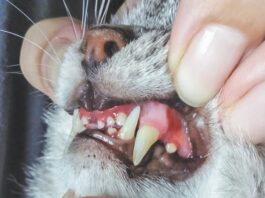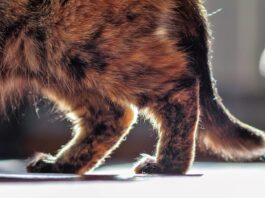PumpkinA Food For All Reasons
Pumpkin is an excellent source of potassiuma mineral that is important for a variety of physiologic functions.
Pumpkin-A Food For All Reasons
Pumpkin is an excellent source of potassium-a mineral that is important for a variety of physiologic functions.
How to Handle a Finicky Eater
Some cats are just naturally picky and like to have variety in their diet, but changes in eating habits can also be a sign of stress or major illness.
When Acrobatic Prowess Fails Them
When it comes to leaping, landing and twisting in mid-air, cats earn accolades for agility, flexibility and acrobatic prowess. Its not unusual to witness your cat leap effortlessly to the top of the refrigerator and, when ready, to land softly and easily on the kitchen floor. But despite their grace and flexible physique, cats do not always land safely on their feet and can be at risk for painful sprains, broken legs, and other fractured bones.
The Trigger for FISS Remains a Mystery
Feline Injection Site Sarcomas (FISS) - which can grow in connective tissue months or years after an injection - continue to concern owners despite reports of low incidence. The reason for their development is the million dollar question, says oncologist Kelly Hume, DVM, ACVIM, at Cornell University College of Veterinary Medicine. We dont know the exact mechanism of the trigger and how it progresses in FISS.
Caring for the At-Home Cancer Patient
Thanks to medical advances and improved nutrition, our cats are living longer than ever. However, longer life increases the likelihood of age-related diseases, including cancer. The Animal Cancer Foundation estimates that 6 million cats are diagnosed with cancer annually. They present a challenge to owners and veterinarians to provide the best quality of life with a minimum of pain.
Easily Missed Signs of Skin Cancer in Cats
These tumors are often diagnosed in their advanced stages because of the cats exceptional ability to hide signs of serious disease. However, new research and emerging targeted therapies have the potential to improve lives. The advances may be able to provide a better outcome to patients stricken with these cancers, says Cheryl Balkman, DVM, ACVIM, Senior Lecturer and Chief of Oncology at Cornell University College of Veterinary Medicine.
In the News: Kitty Gastrointestinal Disease Testing
Two different disorders in cats - inflammatory bowel disease and a cancer of the gastrointestinal tract called alimentary lymphoma - have similar signs, including lack of appetite, weight loss, vomiting and diarrhea.
Ask About Advantages And Drawbacks
If you want to check out a potential clinical trial for your cat, these are questions to ask his veterinarian and the studys research coordinator.
Other Cancer Studies Underway in North America
In addition to ongoing research into feline mammary tumors at Cornell, researchers across North America are evaluating potential diagnostic and treatment options for cats with the disease. Ongoing studies include:
Pursuing Drugs for Mammary Cancer
Researchers studying feline mammary cancer at Cornell University College of Veterinary Medicine have set an ambitious agenda. They hope that their ongoing work will lead to better diagnosis, treatment and prevention of breast tumors in cats and humans. Much of their interest lies in how a novel class of drugs affects breast cell tumors. In a study funded by the Cornell Feline Health Center, Assistant Professor Gerlinde Van de Walle, DVM, Ph.D., and Associate Professor Scott Coonrod, Ph.D., both working at the Baker Institute for Animal Health, have identified a promising chemical, BB-Cl-amidine, that seems to kill off feline mammary cancer cells while leaving healthy cells unaffected.
In The News: January 2015
In little more than a decade, changes have taken place in veterinary medicine to help prevent cats developing malignant tumors at the site of certain vaccinations. However, 22,000 cats in the U.S. still develop injection site-associated sarcomas (ISAS) every year, and the tumors are often more aggressive and prone to recurrence than spontaneous ones.












